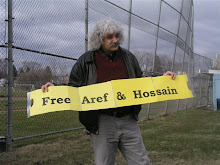
In Albany, the left and the Tea Party folks have been having a dialogue. So far there have been 3 forums, the first on health care the second on climate change and the third on war. Below is my 5 minute opening remarks as part of the panel for the left side of the discussion on war.
Years ago, when I worked against the Vietnam War, the political and economic context of our struggle was very different than it is today. During Vietnam, for example, we had a growth economy; people were able to get jobs; factories were booming. Today, few factories exist in the US. There are few options for young people other than the military. Today, we have an economic draft instead of a real draft as during Vietnam.
Also the cost of today’s wars fall more on the backs of working people and the poor than during Vietnam. Back then, taxes on corporate profits accounted for over 30% of the total tax revenue; today they accounts for less than 8%. Today, nearly 2/3 of all Corporations-- because of tax havens and other tax trickery -- pay no taxes. The tax structure was also much more progressive in the 1960s and 70s with the highest earners paying more of a fair share of the taxes. Today the tax rates have been significantly flattened putting more of a burden on working people and the poor. The disparity between the rich and the poor has increased in the US to the point where today the top 1% is wealthier than the bottom 95%. As the burden of paying for these illegal and immoral wars falls more and more on working people and the poor we see failing state budgets, cuts to social services and deterioration to our country’s infrastructure.
Military expenditures in the US are more than those of all the rest of the countries in the world combined. They account for more than 50% of our present federal budget. Yet, in these hard economic times as people are losing their homes, their healthcare and their jobs, Obama tells us in the state of the Union address that everything will be frozen or cut, except for the military. I think he has his priorities backwards.
The flight of US industry from US shores to find cheaper resources and labor, with no unions, and no environmental or health and safety regulations -- a process known as globalization -- has required new military thinking. To protect US corporate interests abroad we now have our military in over 135 countries with over 800 permanent, foreign military bases. Our now globalized economy will mean permanent war as the US corporate controlled government seeks to protect US corporate interests abroad. As native populations in these countries seek to reclaim their national resources and wealth for the people or their own counties, they will be accused of terrorism and so, as Bush told us, we will have a permanent war on terror. War will be a permanent part of the politics in this country from now on and so the anti-war movement must become a permanent part of politics in opposition to these policies of exploitation and violence.
The war on terror is a fiction. No country can stand against the military might of the US in a battle field as in WWI and WWII. So the wars will be more guerilla warfare with small irregular bands of people seeking to protect their families and communities from US invasions and occupations and foreign corporate exploitation. As the US violently suppresses those who fight back, more anger and resistance will be engendered causing an ever increasing spiral of violence. We will not end terrorism with war we will only end it with peace and collaboration for the good of all. But peace and collaboration stand in stark contrast to the US corporate grab for foreign resources, markets and cheap labor.
The fake war on terror has also justified attacks on our civil liberties at home and abroad. We have seen the continuation of the policies of the Bush administration of warrantless wiretaps, secrecy, arrests without charges and trials with secret evidence. We have seen the scrapping of Geneva Accords, a continuation of black sites, extraordinary renditions and torture. All of this does not end terror; it is terror and gives justification to those who seek violent opposition to the US and its policies.
So, the anti-war movement must continue to connect the dots between the wars, the economic crisis, the attacks on civil liberties and other policies that are affected by these wars. In building the anti-war movement we must insure that our strategy and tactics flow from the idea that while these wars may be in the interest of the multi-national corporations and the few at the top, they are not in the interest of the vast majority of the people of this country or around the world. Therefore, our movement must seek international ties and employ tactics that involve the masses of people for whom war is not in their interest. These tactics must put at their center mass mobilizations that seek to bring these people into political motion instead of having them sit on the sidelines waiting for their political leaders or others to end the wars.
To this end, there will be a mass demonstration in Washington March 20, the 7th anniversary of the war on Iraq. Please see people at the Bethlehem Neighbors for Peace table to get a seat on the bus
Additionally, this summer on July 23 – 25, there will be an historic unity conference in Albany of the national anti-war movement more details will follow soon.
Joe Lombardo




